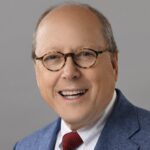TR: Who were some of your clinician role models, and what qualities did you admire in these individuals?
Dr. Baraf: Raymond Scalettar, MD, DSc, FACP, is one of the people who most impresses me with his unrelenting intellectual curiosity. I have known him for several decades, and to this day at age 93, he frequently sends me emails with thoughts on medicine, public health and current events. He does not think of medicine as a 9–5 job, but as a calling and a passion. He cares about patients, and he cares about making the right decisions with patients.
Ludwig Eichna, MD, is another physician I greatly admired. After an illustrious career in academic medicine and after retiring from his position as chair of the Department of Medicine at SUNY Downstate Medical Center, Brooklyn, N.Y., in 1974, Dr. Eichna entered Downstate as a medical student, completed the program and was awarded a second medical degree in 1979. He was inspired to do this to better understand the advances in medical education and knowledge that had accrued in the years since his original medical school education. He wrote brilliantly and thoughtfully on the lessons he learned as a second-time medical student and published these reflections in the New England Journal of Medicine in 1980. His insights were prescient and, amazingly, are still relevant today—more than 40 years since his writings were published.
Norman Koval, MD, was another one of my role models. He was one of the founders of my practice and was a clinical rheumatologist for four decades in the Washington, D.C., area. From Norman, I learned what it means to be interested in, and skilled at, managing a medical practice, understanding business and being actively engaged in the clinical practice of medicine.
TR: What are some of the challenges to developing skills in clinical excellence that one may encounter in the private practice setting?
Dr. Baraf: In the world of private practice, a physician must develop an understanding of how to run a successful small business. They must be adroit at managing payroll, understanding reimbursement, staying up to date on policy changes that affect the practice and ensuring that all physicians and staff work together well as a team. Most of us physicians don’t want to be bothered by understanding the business of medicine, but this is essential in private practice.
At the same time, one must juggle these responsibilities with the goal of staying up to date on the medical literature and continuing to develop clinical reasoning and diagnostic skills. Having a curious and restless mind can be helpful in achieving all of these goals, and staying productive is also important.

